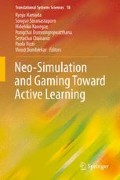Abstract
In 2009, a challenging policy of the Ubon Ratchathani Provincial Administrative Office was launched aiming at the better livelihood of farmers. One scheme was to supply more water to farming areas through pipeline infrastructure. The piping irrigation is beneficial to rice-producing areas by boosting rice productivity. As a result, members of this water user group have expended and caused water use conflict since the water is inequitably managed. The objective of this research was to solve the water use conflict and facilitate the water users to create an equitable and sustainable piping irrigation management through an active learning process. A role-play game (RPG) was built and used for active knowledge exchange activities organized in the village. Playing RPG assisted the participating water users to build a shared representation of the piping irrigation system and observed the “butterfly effect” of interactions at micro level to the system at macro level during gaming sessions.
Access this chapter
Tax calculation will be finalised at checkout
Purchases are for personal use only
References
Office of Agricultural Economics, Agricultural statistics of Thailand, crop year 2006/2007 (2007) Office of Agricultural Economics (OAE), Ministry of Agriculture and Co-operatives: 151, Bangkok, Thailand
Jongdee B et al (2006) Improving drought tolerance in rainfed lowland rice: an example from Thailand. Agric Water Manag 80(1–3):225–240
National Economic and Social Development Board (2003) Thailand’s official poverty line. National Economic and Social Development Board (NESDB): 14, Bangkok, Thailand
Somrith B (1997) Cultivar improvement for rainfed lowland rice in Thailand. In: Proceedings of breeding strategies for rainfed lowland rice in drought-prone environments, ACIAR Proceedings 77. Ubon Ratchathani, Thailand
Cohen JM, Uphoff NT (1980) Participation’s place in rural development: seeking clarity through specificity. World Dev 8(3):213–235
Neef A (2005) Participatory approaches for sustainable land use in Southeast Asia: 407, White Lotus, Bangkok, Thailand
Ashby JA, Sperling L (1995) Institutionalizing participatory, client-driven research and technology development in agriculture. Dev Chang 26:753–770
Fitzpatrick P, Sinclair AJ (2003) Learning through public involvement in environmental assessment hearing. J Environ Manag 67(2):161–174
Walkerden G (2006) Adaptive management planning projects as conflict resolution processes. Ecol Soc 11(1):48
Roux DJ et al (2006) Bridging the science management divide: moving from unidirectional knowledge transfer to knowledge interfacing and sharing. Ecol Soc 11(1):4
Naivinit W (2014) Collaborative modeling to co-produce risk analysis with multi-stakeholders: relationship between seasonal flooded forest management and local food security: 176, Faculty of Agriculture, Ubon Ratchathani University, Bangkok, Thailand
Etienne M, Toit D, Pollard S (2008) ARDI: a co-construction method for participatory modelling in natural resources management: iEMSs: international congress on environmental modelling and software: integrating sciences and information technology for environmental assessment and decision making. 2008. Barcelona, Spain
Banks J (ed) (1998) Principles of simulation, in handbook of simulation: principles, methodology, advances, applications, and practice: 3–30. Wiley, Atlanta
Acknowledgment
The author would like to thank the Thailand Research Fund (TRF) for its financial support.
Author information
Authors and Affiliations
Corresponding author
Editor information
Editors and Affiliations
Rights and permissions
Copyright information
© 2019 Springer Nature Singapore Pte Ltd.
About this chapter
Cite this chapter
Naivinit, W., Suwanna, W., Sena, S., Nareenuch, D. (2019). Using Role-Play Game for Active Learning to Solve Water Inequity. In: Hamada, R., et al. Neo-Simulation and Gaming Toward Active Learning. Translational Systems Sciences, vol 18. Springer, Singapore. https://doi.org/10.1007/978-981-13-8039-6_21
Download citation
DOI: https://doi.org/10.1007/978-981-13-8039-6_21
Published:
Publisher Name: Springer, Singapore
Print ISBN: 978-981-13-8038-9
Online ISBN: 978-981-13-8039-6
eBook Packages: Economics and FinanceEconomics and Finance (R0)

